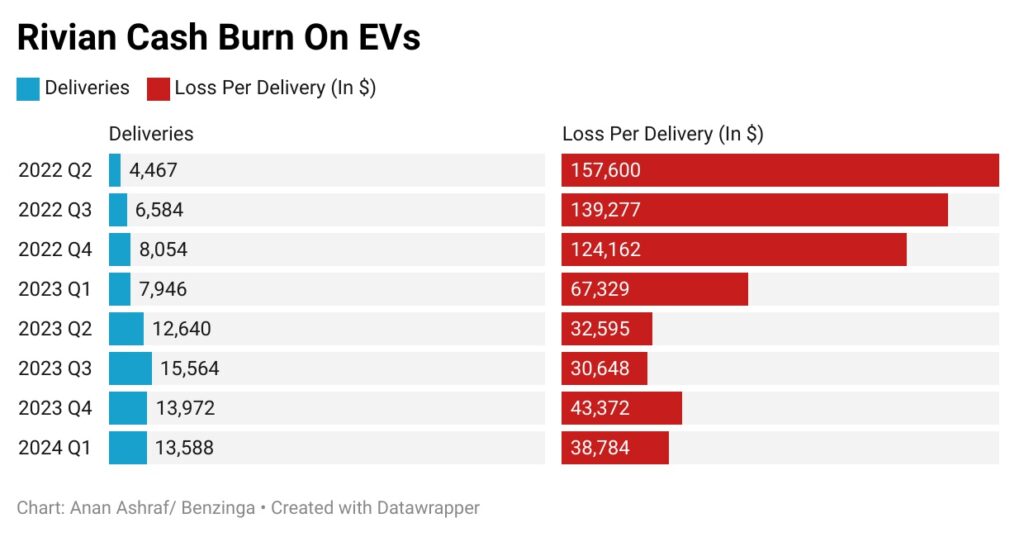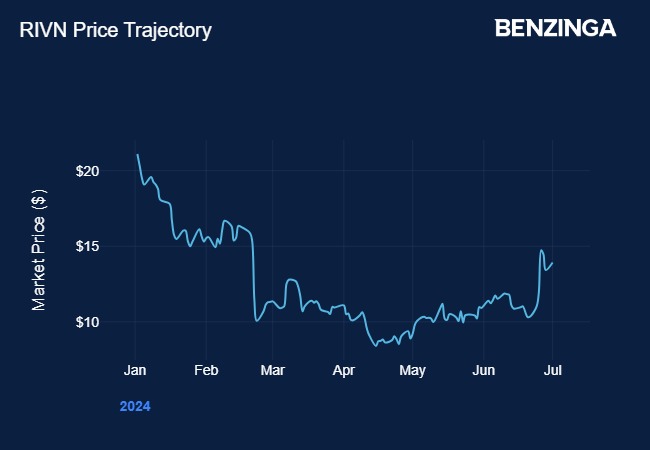California-based EV maker Rivian Automotive Inc. RIVN has been gaining investor interest in the past week, mostly due to a major investment by German automaker Volkswagen in the latter part of June. But there is more to the company’s attempts at achieving profitability.
Financial Shape: Rivian, despite its R1 vehicle offerings that have been well received, is yet to turn a profit. The company has been accumulating losses for every vehicle it delivered until the first quarter of 2024 when it made a loss of nearly $39,000 for each of the 13,588 vehicles it sold.
While this is a significant loss to incur on a vehicle starting at roughly $70,000, it is still lower than the first quarter of 2023 when it incurred a loss of about $67,000 on every vehicle it delivered.
The company, until recently, was looking to scale production to bring down losses. In the third quarter of 2023, the company sold over 15,000 vehicles and recorded a loss of about $31,000 on each, the least quarterly loss per delivery recorded by the company.
However, for 2024, Rivian expects to make only 57,000 vehicles, largely in line with its production rate last year when it produced 57,232 vehicles and delivered 50,122.

Race To Profitability: Rivian is looking to turn its first-ever quarterly gross profit in the fourth quarter of 2024. The latest in its strategy is the announcement of its intent to form a joint venture with Volkswagen aimed at creating software-defined vehicle platforms to be used in both players' future electric vehicles starting in the second half of the decade.
As part of the terms of the deal, Volkswagen will initially invest $1 billion in Rivian and then up to $4 billion until 2026. Both companies shall hold a 50% stake in the JV which is expected to be formed by the fourth quarter of 2024.
Brian Moody, an analyst at Cox Automotive, believes the JV can aid both the players.
“For Rivian, they can expand their footprint of stores or distribution points. Rivian also benefits from Volkswagen's substantial manufacturing expertise – this should help Rivian become more efficient. Rivian can also get their affordable EV to market quicker and VW has a lot of marketing experience that should benefit Rivian,” he said.
“For VW it will help with software development – a difficult and costly part of electric cars.”
However, Moody also has his concerns. “One thing that will be something to watch – will Rivian's startup culture blend well with VW's more traditional culture?” Moody said.
Cost Cutting Initiatives: Rivian introduced its second generation R1 vehicles in June, aimed at lowering manufacturing costs and reducing parts while simultaneously increasing performance.
Moody believes the decision is very wise.
“Unlike EV giant Tesla which has kept their cars looking largely the same for a long period of time, Rivian knows that shoppers and buyers expect to see updates to a vehicle's look and features every few years,” he said.
Other EV startups haven’t had the same luck as Rivian in forming deals with rival automakers. Another California-based EV maker Fisker filed for bankruptcy in June after potential investment talks with a major automaker collapsed in March, joining Lordstown Motors which met the same end in 2023.
Fisker sold thousands of units of its Ocean SUVs expected to rival Tesla’s Model Y SUV before winding down.
"VW's recent investment and their cost-cutting along with vehicle updates will help Rivian make the transition from early adopter darling to something that will appeal to the average middle-class family," Moody said.
Green Car Guide Founder and editor Paul Clarke, however, is not as optimistic. “Starting up a new car company requires a huge capital; what happens when you don’t have this cash has been demonstrated by Fisker, Rivian, and others.”
“Volkswagen is giving a $1 billion cash injection into Rivian as part of a $5 agreement, so that will help, but it may not be enough,” Clarke said.
Cheaper Offerings To Expand Addressable Market: Rivian is currently developing a smaller, cheaper R2 SUV which is expected to go into production in early 2026 to appeal to a larger market base. The vehicle is expected to be priced at around $45,000, in the same price range as Tesla's best-selling Model Y SUV.
But several automakers, including South Korea's Kia, have had EVs at that price point for some time, Moody noted. Rivian should, instead aim for a $35,000-$38,000 price point, Moody recommended, particularly given that price is a barrier to several customers who are open to EVs.
“The one thing that is nearly impossible to predict is how the public will receive the R2. It does look different, and that's important. Plus, buyers really gravitate toward small crossover SUVs,” he said.
Clarke, too, is looking forward to cheaper offerings from the startup but is doubtful of the company’s financial ability to pull it off.
“Rivian, which has a good product, started up when signs were encouraging for growing EV sales, but it is in a fairly specialized niche of electric pick-ups—even though this is a popular body style for ICE models in the US,” Clarke said.
“Headwinds for EV sales haven’t helped Rivian, and other electric pick-up rivals are coming from established manufacturers such as Toyota. It will be an interesting story to see if and how Volkswagen can turn this around.”
A Trump presidency, he added, will only aggravate the challenges.
Short-Term Outlook: Rivian CEO RJ Scaringe said in May that the company is experiencing a slowdown in the second quarter due to a production shutdown in early April aimed at upgrading its facility in Normal, Illinois.
“From an investor perspective, the second quarter’s going to be messy,” the CEO warned at Bernstein's 40th Annual Strategic Decisions Conference.
Price Action: Rivian shares are down 34% year-to-date but have risen over 25% in the last five days following the JV announcement.

Check out more of Benzinga's Future Of Mobility coverage by following this link.
Read More:
Photo courtesy: Rivian
Edge Rankings
Price Trend
© 2025 Benzinga.com. Benzinga does not provide investment advice. All rights reserved.
Trade confidently with insights and alerts from analyst ratings, free reports and breaking news that affects the stocks you care about.